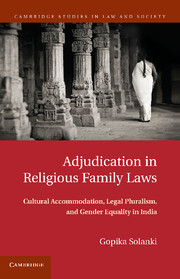 Adjudication in Religious Family Laws
Adjudication in Religious Family Laws Book contents
- Frontmatter
- Contents
- List of Figures
- List of Tables
- Preface
- Acknowledgments
- Abbreviations
- Glossary
- 1 Introduction
- 2 The Shared Adjudication Model
- 3 State Law and the Adjudication Process
- 4 Making and Unmaking the Conjugal Family
- 5 Juristic Diversity, Contestations over “Islamic Law,” and Women's Rights
- 6 Conclusion
- Appendix
- Bibliography
- Index
- CAMBRIDGE STUDIES IN LAW AND SOCIETY
1 - Introduction
Published online by Cambridge University Press: 03 May 2011
- Frontmatter
- Contents
- List of Figures
- List of Tables
- Preface
- Acknowledgments
- Abbreviations
- Glossary
- 1 Introduction
- 2 The Shared Adjudication Model
- 3 State Law and the Adjudication Process
- 4 Making and Unmaking the Conjugal Family
- 5 Juristic Diversity, Contestations over “Islamic Law,” and Women's Rights
- 6 Conclusion
- Appendix
- Bibliography
- Index
- CAMBRIDGE STUDIES IN LAW AND SOCIETY
Summary
Multireligious, multiethnic, and culturally plural postcolonial societies debate over who should govern the family as states and religious groups struggle to regulate the family. There are several reasons why states and groups aim to regulate the conjugal family: States realize their liberal, secular projects by infiltrating and fashioning individual subjectivities. States also strive for social cohesion, the transmission of property (Glendon 1981, 1989), and the delegation of welfare responsibilities (Menski 2001). In addition, the regulation of family is often tied to the nation-building projects of states (Heuer 2005; Loos 2006; Woods 2004). Furthermore, the demarcation of kinship boundaries forms the basis of the state; it creates race, caste, and religious groups (Cott 2000; Loos 2006), and enables the state to perpetuate itself (Hanley 1989; Stevens 1999). Similarly, religious and cultural groups identify religious or customary laws as markers of group identity and seek autonomy to govern the family. Groups, too, seek to perpetuate themselves and attempt to impact upon or subvert the statist vision of the nation by regulating the family (Woods 2004; Yuval-Davis 1997).
In this context, the key question is whether states should adopt legal centralism and enact uniform laws to govern the family, or provide autonomy to religious or cultural groups through the adoption of legal pluralism. States like Turkey, Thailand, and Ethiopia, which have not been officially colonized, have enacted uniform civil codes, though neither has been successful in wiping out legal pluralism on the ground.
- Type
- Chapter
- Information
- Adjudication in Religious Family LawsCultural Accommodation, Legal Pluralism, and Gender Equality in India, pp. 1 - 40Publisher: Cambridge University PressPrint publication year: 2011
